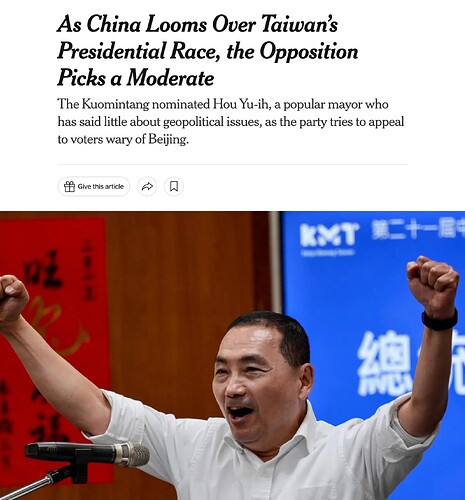-
台湾国民党已提名前国家警察机构负责人、现任市长侯友宜为2024年总统选举的候选人。侯友宜具有跨党派的广泛吸引力,但在处理台湾海峡的地缘政治动态方面经验有限。选举结果对美中关系具有重大影响,因为它将有助于决定两国之间日益紧张的关系的发展轨迹。
-
台湾的命运是美中关系中最敏感的潜在爆发点。在蔡英文总统担任总统的七年里,台湾以牺牲中国为代价与美国建立了更紧密的关系。执政的民进党去年遭受了十年来最严重的选举挫折,为国民党打开了一个机会,国民党倾向于与北京建立更友好的关系。
-
侯友宜是代表国民党的一个不同寻常的人选,因为他在台湾的家庭根基早于1949年,而且具有务实的声誉。他在接受采访时把普通话改成了当地语言,这是对当地文化的一种肯定。他与北京或华盛顿打交道的经验不多,直到最近才对中国问题采取立场。他拒绝了台湾独立的可能性,以及北京在 "一国两制 "框架下治理台湾的建议。
-
在某些方面,侯友宜是代表国民党的不寻常人选,因为他在台湾的家庭根基早于1949年,而且他一直回避公开的政党政治。
-
他的祖先背景和务实的声誉使他在广大选民中受欢迎。
-
他在接受采访时改用当地语言,显示了对当地文化的尊重。
-
侯友宜与北京或华盛顿打交道的经验不多,在很大程度上回避了对中国的立场。
-
他拒绝了台湾独立的可能性和北京在 "一国两制 "框架下治理台湾的建议。
-
相对于其他国民党领导人,他似乎正试图在中国问题上占据一个温和的立场。
-
他击败了亿万富翁郭台铭,郭台铭与中国关系密切,并直言不讳地表示要培养与中国的经济联系。
-
苟仲文称赞侯友宜是国民党的最佳选择,并发誓支持他的候选资格。
-
在国民党总部外,几十名党的支持者举着中华民国的旗帜聚集在一起,而一小群人则抗议提名过程。
-
国民党(KMT)最近宣布了他们在即将举行的台湾总统选举中的候选人。
-
前台北市长柯文哲也被台湾人民党(TPP)正式提名。
-
最近的民调数据显示,三个党派的候选人中没有一个在竞争中具有明显的领先优势,这表明在1900万台湾选民于1月13日前往投票站之前,竞争将一直很激烈。
-
Taiwan’s Nationalist Party has nominated Hou Yu-ih, a former head of the national police agency and incumbent mayor, as its candidate for the 2024 presidential election. Hou has broad appeal across party lines but has limited experience dealing with the geopolitical dynamics in the Taiwan Strait. The outcome of the election carries heavy implications for US-China relations as it will help determine the trajectory of increasingly strained relations between the two countries.
-
The fate of Taiwan is the most sensitive potential flashpoint in US-China relations. Over the seven years of President Tsai Ing-wen’s presidency, Taiwan has forged closer ties with the US at the expense of China. The ruling Democratic Progressive Party suffered its worst electoral setback in a decade last year, opening up an opportunity for the KMT, which favors friendlier ties with Beijing.
-
Hou is an unusual choice to represent the KMT as he boasts family roots in Taiwan that predate 1949 and has a pragmatic reputation. He switched from Mandarin into the local language during his acceptance speech, a nod to local culture. He has little experience dealing with either Beijing or Washington and has shied away from taking a stance on China until recently. He rejected the possibility of independence for Taiwan as well as Beijing’s proposal to govern Taiwan under a “One Country, Two Systems” framework.
-
Hou is in some respects an unusual choice to represent the KMT because he has family roots in Taiwan that predate 1949 and he has shied away from overt party politics.
-
His ancestral background and pragmatic reputation make him popular among a wide swath of voters.
-
He switched to the local language during his acceptance speech, showing respect for local culture.
-
Hou has little experience dealing with either Beijing or Washington and has largely shied away from taking a stance on China.
-
He rejected the possibility of independence for Taiwan and Beijing’s proposal to govern Taiwan under a “One Country, Two Systems” framework.
-
He appears to be trying to stake out a moderate position on China relative to other KMT leaders.
-
He beat out billionaire Terry Gou, who has tight ties to China and has been outspoken about nurturing economic links with China.
-
Gou hailed Hou as the best choice for the KMT and vowed to support his candidacy.
-
Outside KMT headquarters, a few dozen party supporters gathered with Republic of China flags while a small group of people protested the nomination process.
-
The Kuomintang (KMT) recently announced their candidate for the upcoming Taiwanese presidential election.
-
Former Taipei mayor Ko Wen-je was also formally nominated by the Taiwan’s People Party (TPP).
-
Recent polling data shows that none of the three party candidates has a significant leading advantage over the competition, indicating the race will remain tight until the 19 million Taiwanese voters head to the polls on Jan. 13.
